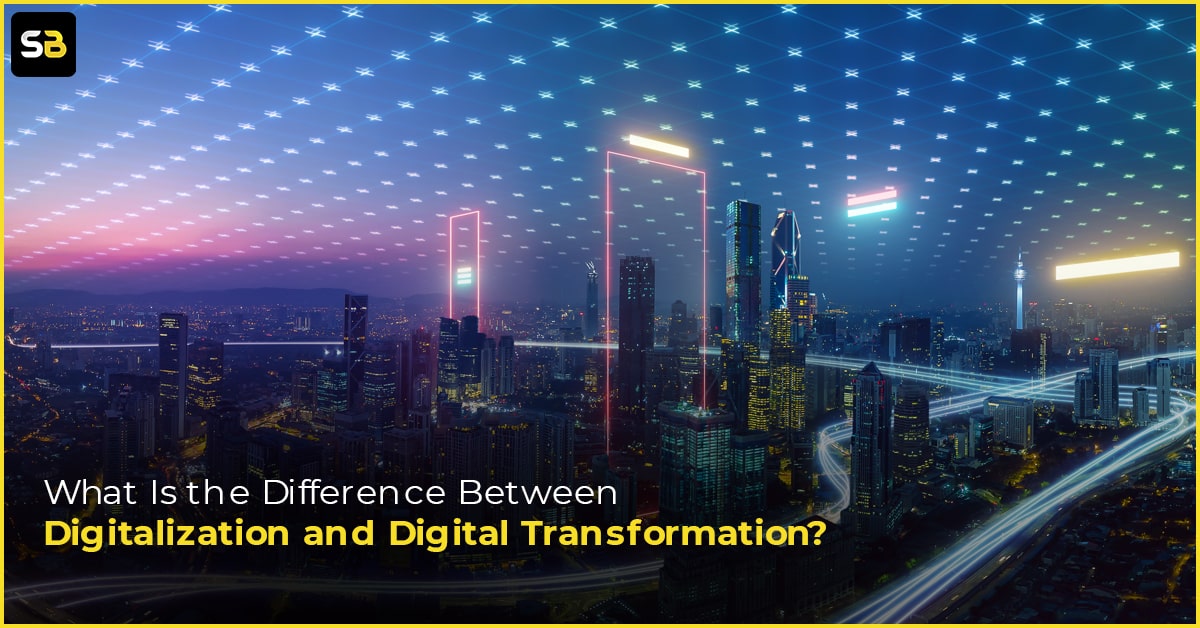
- Sep 02, 2022
What Is the Difference Between Digitalization and Digital Transformation?
Although there is interest in cutting-edge digital technologies and an understanding of their competitive importance, it is still unclear how to make use of these prospects to develop a digital transformation strategy. This misunderstanding may be caused in part by the words we employ. More precisely, the incorrect use of the phrases digitization and digitalization, are two fundamental concepts in digital transformation. Despite the fact that they are frequently used interchangeably with "digital transformation," these terms refer to completely different concepts. Digital transformation is the transformation of company activities, processes, products, and models to fully take advantage of the opportunities provided by digital technologies. Digitalization is the process of utilizing digitalization to improve business processes. Let us give you a detailed explanation of the distinctions between these terminologies as well as some illustrations.
What is Digitalization?
Digitalization and digitization go hand in hand. Although they are two distinct concepts, they are frequently used interchangeably. Digitalization is the process of utilizing technology to enhance corporate operations. Making digital information useful to you is what digitalization entails. This phrase describes the use of data and digital technologies to generate revenue, advance commerce, and foster a digital culture where digital information is central. It changes processes to make them more profitable, productive, and efficient. Examples- Transferring a PDF file from a computer's hard disk to the cloud and distributing it widely for data analysis;
- Converting an Excel spreadsheet to a cloud-based Google Sheet. The platform offers an organized setting where users can share documents with one another. However, updating a Google Sheet involves input from a human.
- Using web services to upload digital movies from CD, DVD, or Blu-Ray discs. They're available for download or rental.
What is a Digital Transformation?
Digitalization is a crucial step toward digital transformation and has a significant effect on the distribution of products, services, and people. It represents a cultural change within an organization, reshaping the way value is created and business is conducted. Digital transformation is basically the transformation of business activities, products, processes, and models to completely leverage the opportunities of digital technologies. Enhancing efficiency, managing risk, or finding new monetization opportunities are the key objectives. A new (digital) manner of doing anything is known as digital transformation. Examples- Transferring the data from a Google Sheet into an app or software that will analyze the data, or read the data from an online PDF. The objective is to provide us with information so that we may offer new items or deliver better customer service. Because this procedure is automated, there isn't much need for human interaction. As a result, it boosts productivity, cuts expenses, and even increases sales.
- Internet movie streaming, obtaining customer data for analysis, creating customized suggestions, offers, and advertisements.
Explaining the difference between Digitization and Digital Transformation
 Simply said, digitalization is integrating technology into ongoing corporate operations. New, digital methods of doing things are referred to as "digital transformation." Digital transformation is a broader idea than digitalization.
Parts of a digital transformation include digitization and digitalization. Every element of an organization is affected by digital transformation, including growth strategy, corporate mobile applications, process digitization, worker enablement, worker performance, new business models, and more. It results in a whole new market as well as brand-new clientele and commercial realities.
Simply said, digitalization is integrating technology into ongoing corporate operations. New, digital methods of doing things are referred to as "digital transformation." Digital transformation is a broader idea than digitalization.
Parts of a digital transformation include digitization and digitalization. Every element of an organization is affected by digital transformation, including growth strategy, corporate mobile applications, process digitization, worker enablement, worker performance, new business models, and more. It results in a whole new market as well as brand-new clientele and commercial realities.
Why is Digital Transformation important?
 The overarching objective of digital transformation is to boost people's and organizations' productivity and creativity (decision-making, connectedness, invention, and augmentation). In this situation, technologies like smart devices, cloud and fog computing, big data and analytics, social media and networking, cognitive computing, and artificial intelligence offer unparalleled access to knowledge and resource pools, leading to more innovation and results.
Digital transformation aims to benefit from the possibilities and opportunities provided by new technology in a quicker, better, and more creative manner in addition to drastically expanding the reach of companies. Effective strategies take this into account because true digital transformation is a continual process, just like change and innovation in the digital space.
Essentially, digital transformation prepares businesses to become agile, enabling them to quickly recognize, respond to, and adapt to changes in customer and employee expectations and needs as well as the broader business environment.
Essentially, digital transformation prepares businesses to become agile, enabling them to quickly recognize, respond to, and adapt to changes in customer and employee expectations and needs as well as the broader business environment.
The overarching objective of digital transformation is to boost people's and organizations' productivity and creativity (decision-making, connectedness, invention, and augmentation). In this situation, technologies like smart devices, cloud and fog computing, big data and analytics, social media and networking, cognitive computing, and artificial intelligence offer unparalleled access to knowledge and resource pools, leading to more innovation and results.
Digital transformation aims to benefit from the possibilities and opportunities provided by new technology in a quicker, better, and more creative manner in addition to drastically expanding the reach of companies. Effective strategies take this into account because true digital transformation is a continual process, just like change and innovation in the digital space.
Essentially, digital transformation prepares businesses to become agile, enabling them to quickly recognize, respond to, and adapt to changes in customer and employee expectations and needs as well as the broader business environment.
Essentially, digital transformation prepares businesses to become agile, enabling them to quickly recognize, respond to, and adapt to changes in customer and employee expectations and needs as well as the broader business environment.
The business environment has evolved due to the Digital Age
 Information is converted from an analog to a digital representation through the process of digitization. Digitalization is the use of this process by a firm to enhance operations, generate income, or streamline some processes. Digital transformation is the term used to describe process outcomes. In order to establish a digital firm, digital transformation necessitates digitalization. The corporate environment is changing as we enter the Digital Age.
Beyond the execution of projects, the industry expects the creation of job prospects, environmental improvement, area regeneration, or increased accessibility. More significantly, the industry can achieve these project results and, by emphasizing the maximizing of social value, may promote much-needed social transformation.
You may see digitization and digitalization as the initial stages of the digital transformation process. To develop a workable digital transformation strategy, determine where your company is now at in this process, and take advantage of the benefits each of these processes brings about, it is essential to understand the differences between these concepts.
Get in touch with SB Infowaves to learn how our unmatched digital transformation solution can help your business grow.
Information is converted from an analog to a digital representation through the process of digitization. Digitalization is the use of this process by a firm to enhance operations, generate income, or streamline some processes. Digital transformation is the term used to describe process outcomes. In order to establish a digital firm, digital transformation necessitates digitalization. The corporate environment is changing as we enter the Digital Age.
Beyond the execution of projects, the industry expects the creation of job prospects, environmental improvement, area regeneration, or increased accessibility. More significantly, the industry can achieve these project results and, by emphasizing the maximizing of social value, may promote much-needed social transformation.
You may see digitization and digitalization as the initial stages of the digital transformation process. To develop a workable digital transformation strategy, determine where your company is now at in this process, and take advantage of the benefits each of these processes brings about, it is essential to understand the differences between these concepts.
Get in touch with SB Infowaves to learn how our unmatched digital transformation solution can help your business grow.
Our Office

USA
Seattle
2515 4th Avenue, Centennial Tower Seattle 98121
United States Of America
+1-7543-335-140

Australia
Sydney
Rubix Alliance Pty Ltd Suite 305/30 Kingsway, Cronulla NSW 2230
+6-1480-023-313

India
Kolkata
Adventz Infinity, Office No - 1509 BN - 5, Street Number -18 Bidhannagar, Kolkata - 700091 West Bengal
+91-8240-823-048
India
Bengaluru
KEONICS, #29/A (E), 27th Main, 7th Cross Rd, 1st Sector, HSR Layout, Bengaluru, Karnataka 560102
+91-9804-360-617
Unleash the Sales Beast Within and Watch Your Revenue Soar!
GET A FREE ANALYSIS OF YOUR WEBSITE NOW!








